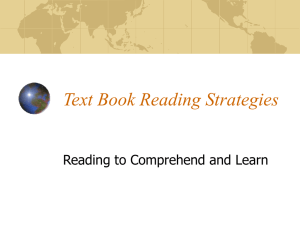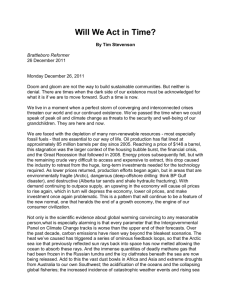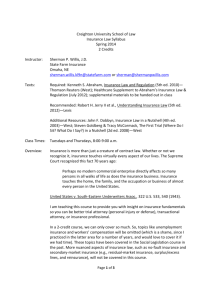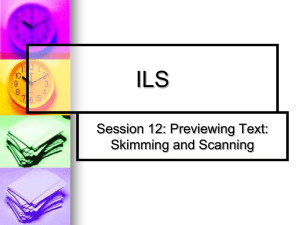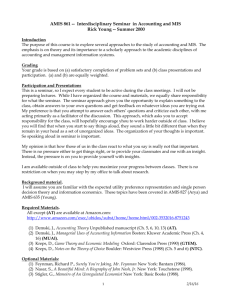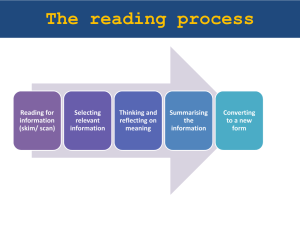Faculty Home Page - Westlaw for Law Schools
advertisement
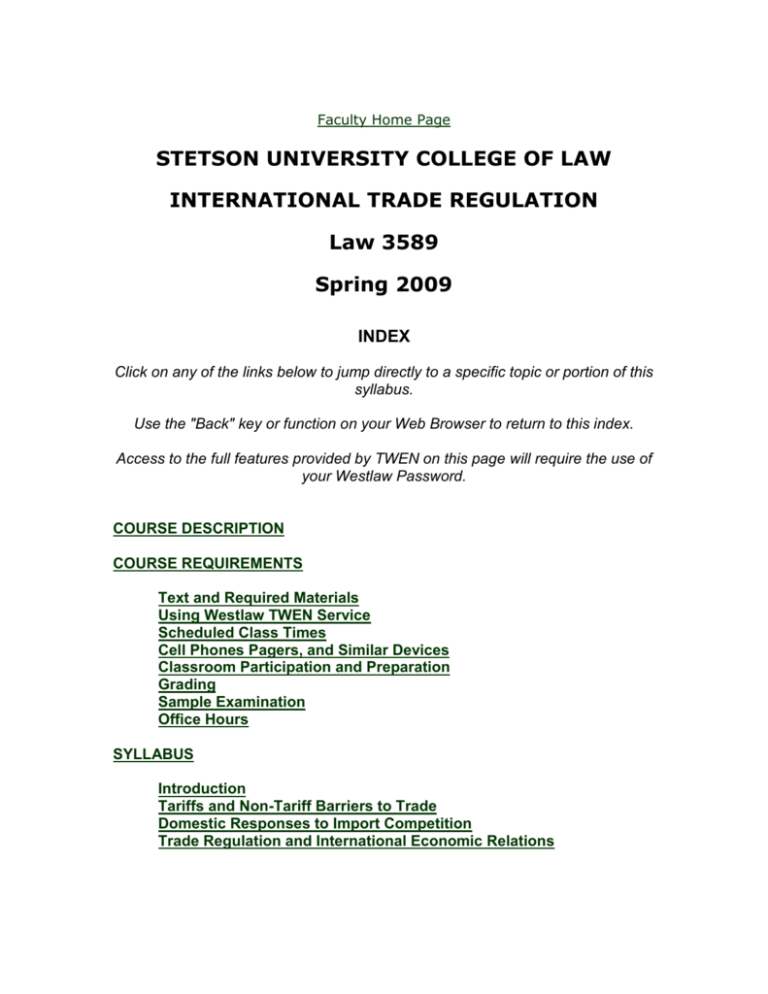
Faculty Home Page STETSON UNIVERSITY COLLEGE OF LAW INTERNATIONAL TRADE REGULATION Law 3589 Spring 2009 INDEX Click on any of the links below to jump directly to a specific topic or portion of this syllabus. Use the "Back" key or function on your Web Browser to return to this index. Access to the full features provided by TWEN on this page will require the use of your Westlaw Password. COURSE DESCRIPTION COURSE REQUIREMENTS Text and Required Materials Using Westlaw TWEN Service Scheduled Class Times Cell Phones Pagers, and Similar Devices Classroom Participation and Preparation Grading Sample Examination Office Hours SYLLABUS Introduction Tariffs and Non-Tariff Barriers to Trade Domestic Responses to Import Competition Trade Regulation and International Economic Relations COURSE DESCRIPTION This course will address some of the issues associated with the governmental regulation of international trade, through a problem oriented approach. At least two regulatory systems will be considered in almost every problem, one being the regulatory regime embodied in the domestic law of the country of import or export (typically the United States), and the other being the system of international agreements (such as WTO/GATT and NAFTA) that are intended to limit the actions which may be taken by individual governments. The impact of "globalization" within this framework will also be considered. Three major areas will be explored (1) tariffs and non-tariff barriers to trade, (2) domestic responses to import competition, and (3) trade regulation and international economic relations. These are topics which potentially concern any business dealing internationally, from global multinational corporations to small start-up ventures desiring to expand abroad. The laws regulating international trade build upon concepts and principles which are studied in greater detail in a broad number of other courses, such as Administrative Law, Antitrust, Comparative Law, Conflicts, International Arbitration/Dispute Resolution, and International Law. While none of these are required as prerequisites, students may find it helpful to consult the standard treatises as questions arise, particularly in International Law and International Economic Law. Additionally, International Trade Regulation and International Business Transactions should be regarded as complimentary course offerings. Although it is sometimes difficult to separate public and private law issues when dealing with international business, this course generally focuses upon the issues associated with governmental controls on trade, whereas International Business Transactions emphasizes the problems encountered by private parties putting international transactions together. Thus, while "ITR" and "IBT" are related offerings, neither course is a prerequisite for the other. (Note: Students may not take both this course and the International Trade and the Environment course.) COURSE REQUIREMENTS As law students you are members of the legal profession, and professional behavior is expected with respect to your conduct in the class, and all activities and assignments related to the course, in accordance with the Code of Student Professionalism and Conduct and the Academic Honor Code. Even though the law school environment looks deceptively like U.S. undergraduate school or the schooling you may have received in another country, as a professional school a high level of behavior, preparation, and attention to detail, is required in all that you do. Accordingly, beyond adhering to the formal standards of these Codes, it may also be helpful to develop the habit of treating your classes and related work as if they were court proceedings, assignments from a law firm partner, a meeting with a client, or other similar professional activities. Text and Required Materials Folsom, Gordon, Spanogle, & Fitzgerald, International Business Transactions: A Problem Oriented Coursebook, (Ninth Edition, 2006) and the accompanying 2006 Documents Supplement are required. Earlier editions are not acceptable. Additional material will be distributed via links in this syllabus, email, or in handouts distributed at various times during the semester. There is also a wealth of additional useful material available on the Internet. While no other materials are necessary or required for the course, those who would like an additional secondary text might want to consider either Jerold A. Friedland, Understanding International Business and Financial Transactions (Second Edition, 2005), or Folsom, Gordon, and Spanogle’s International Business Transactions, Trade & Economic Relations in a Nutshell (West 4th Edition 2009). Moreover, you will find that all the major news media will run stories concerning the issues addressed in this course on a weekly, if not daily, basis. Following these stories will provide added background and context for many of the topics we will be considering. While we will not be specifically using these materials in class, those interested in the broader general debates over "globalization" may wish to read some of the current literature on this increasingly popular topic, including Thomas L. Friedman's The World Is Flat: A Brief History of the Twenty-first Century, or his earlier book The Lexus and the Olive Tree; Harold James' The End of Globalization : Lessons from the Great Depression; or Amartya Sen's Development As Freedom, for example. Using the Westlaw TWEN Service You must both register your Westlaw password on the TWEN service and add this ITR course to your Westlaw TWEN home page in order to have full access to the online materials and course listserv: -To register your password, go to http://lawschool.westlaw.com, click on the link for TWEN, and follow the registration prompts, -To add the course to your TWEN home page, log into TWEN and follow the prompts to add/drop a course. Even if you were in the IBT class last semester, as this is a separate course you will still need to re-register this course to add ITR to your TWEN home page, -If you need assistance, download the Student Guide to TWEN file: http://west.thomson.com/store/product.aspx?product_id=RM157045, or use the Westlaw help function (online or 1-800-850-WEST), or email west.support@thomson.com. Scheduled Class Times The class will meet from 3:10 p.m. to 4:35 p.m. on Mondays and Wednesdays in Classroom E. A seating chart will be distributed at the beginning of each semester, and you should identify the seat you will use for the duration of that semester on the chart. In accordance with the College of Law Attendance Policy, failure to attend 80% of the scheduled classes (i.e. six or more absences for any reason) will result in automatic exclusion from the examination and loss of all credit for the course. A class roll will be circulated to document your attendance, please remember to sign the roll for each class when it is circulated, and sign only your own name. The class roll will be the only "official" record of your presence or absence, and a failure to properly sign the roll on the day it is circulated is an "absence" for that day irrespective of whether you were actually present or not. Please arrive on time. Arriving late or leaving while class is in session may be treated as an "absence" and/or result in an adverse "class participation" grade. Cell Phones, Pagers, and Similar Devices Please do not allow your cellular phones, pagers, palm pilots, computer, or other devices to ring or beep during class. If a potential emergency situation requires that you must be able to be contacted during class, try to let me know in advance, ensure that your phone or other device is silent, and leave the classroom to respond to the call. Also, please refrain from using the Internet or other network tools during class unless directed to do so, listening to iPods or similar devices, or engaging in behavior that might be distracting to others. Classroom Participation and Preparation Each class will revolve around a hypothetical Problem from the Text, and its associated materials. Your active involvement in the classroom, whether in response to being called upon or by volunteering to join the discussion by raising your hand, is both expected and required. Continuing the discussions begun in class among your classmates using the “ITR Discussion” email list (accessible from the TWEN menu to the left) is also encouraged. Your participation in the classroom discussion and analysis of these Problems is important, and required. If you feel uniquely disadvantaged by a grading system which takes class participation into account, please discuss this with me before the end of the add/drop period. Additionally, all students are expected to be fully prepared for each class. We will ordinarily use two class periods to examine each Problem, but some Problems will be addressed in fewer classes. Additionally, the short introductory sections which the text also labels as "Problems" (i.e. 6.0, 7.0, 8.0) should be combined with whatever Problem follows them in the syllabus, and treated as a single reading assignment. In preparing for class, it is advisable to skim through the entire Chapter prior to our consideration of any particular Problem to get an overview of the issues, and then review the material again as we go though our classroom discussions. When the Problems make any reference to statutory material or international agreements, be sure to check the Documents Supplement for the applicable material and to become familiar with the pertinent provisions. Additionally, your analysis of each Problem should begin with determining what are the possible national, regional, and international sources of legal rules that might apply to the facts, and locating the pertinent provisions in the Documents Supplement, whether or not they are specifically referenced in the readings. The initial syllabus provided below will change during the course of the semester once we see how the class progresses. When these changes occur they will be announced in class, and posted to the ITR Discussion List. You are deemed to be fully “on notice” of any material distributed to you by email, and this includes messages on the TWEN ITR Discussion List, so be sure to check your email accounts and these course pages regularly. You are allowed one “free pass” each semester, where you will not be adversely affected for being unprepared. In order to use the “free pass,” give me a written note with your name on it at the beginning of class requesting that you not be called upon that day. You may not invoke the “free pass” if you are called upon in class, but failed to provide the note in advance. Grading The grade in this course will be based upon both classroom participation and an examination. Your participation in the classroom will be graded as a "check ", "check +", or "check -". Strong, high quality, sustained participation in the classroom will receive a "check +", and raise the final grade by one quarter of one point (e.g. raising a 3.0 to 3.25). A failure to meaningfully contribute to the classroom discussions will receive a "check -", and lower the final grade by one quarter of one point (e.g. lowering a 3.0 to 2.75). Average participation will receive a "check " and neither raise nor lower the final grade. The examination is scheduled for Wednesday, May 6, 2009. It will be a three hour exam, and may include objective (i.e. multiple choice, true/false, or short answer) questions and/or one or more essay questions. It will be an open book examination, and you will be permitted to bring the NINTH EDITION of the Text, Document Supplement, and any material distributed in class with you to the exam. You may also bring any class outlines which you prepare, but no other books, materials, nutshells, or commercial or other outlines. You are encouraged to annotate your Text and Document Supplement as we proceed through the course, but please do not abuse this privilege by attempting the wholesale incorporation of commercial or other outlines into your materials. Additionally, I will conduct an informal "question and answer" session (outside of normal class time) prior to the examination at the end of the semester. Note that, under the College of Law policy, if you intend to use your computer to take the exam you must use special software which essentially locks you out of all computer functions other than a simple word processor used for your responses to the exam questions. Accordingly, you will need to print out your course outline in advance and bring it with you to the examination. Otherwise, you will be unable to access the materials you have on your computer during the exam itself. Sample Examination A previous final examination, with answers, will be made available for you to use as a study aid sometime later during the semester. To bolster your exam taking skills, I also recommend the Center for Computer-Assisted Legal Instruction (CALI) program Writing Better Law School Exams: The Importance of Structure. This computerized instruction program on examination skills takes approximately 1 1/2 hours to complete, and is available either on Stetson's computer network or direct from CALI. Office Hours Please come by whenever you have questions! I have an "open door policy," no appointments are necessary. However, please try to avoid coming by immediately before a class if possible, as Professors do last minute class prep just like students! I am usually in my office Monday through Friday from 9:00 to 5:00 (or later), except when I am in class (10:40 a.m. -- 12:05 p.m., and 3:10 p.m. – 4:35 p.m. Mondays; 3:10 p.m. – 4:35 p.m. Wednesdays; and 10:40 a.m. -- 12:05 p.m on Thursdays). Additionally, feel free to call or use e-mail if you are unable to come by in person. Also remember that you can use the online discussion list both to ask questions of your own, and to answer questions posed by others. A special note: an older Golden Retriever named "Hamish" shares the office with me. He is a certified therapy dog and very calm, extremely friendly, and loves visitors! However, if you would like to meet with me and have allergies or otherwise would simply prefer not to deal with Hamish, just let me know and we can make appropriate alternate arrangements. SYLLABUS Updates And Notices During The Semester There will be changes, updates, and additional assignments that occur from time to time during the course of the semester. Please remember to disable all cell phones, pagers, and computer sound cards/devices prior to each class! Introduction Introduction to Basic Principles, Terms, and Organizations Chapters 1-2 & Doc. Supp. Glossaries (skim) Browse the "Understanding the WTO" pages of the World Trade Organization Tariffs and Non-Tariff Barriers to Trade Customs Clearance Overview, Problem 6.0 "Introduction" World Trade Organization Problem 6.1 "Oxicorp Trades with Nonmarket/Transition Economies" HTS General Note 3(a)&(b) (DS p. 723) Trade Act of '74 §§ 401, 402 (19 USC 2431, 2432) (DS p. 674-675) Trade Act of '74 § 405 (19 USC 2435) GATT Arts. I, II, III, XXVIIIbis (DS pp. 103, 104, 106, 143) GATT '94 (DS p. 165) Skim WTO Dispute Settlement Understanding (DS p. 175) WTO Agreements: Overview: A Navigational Guide Skim WTO Legal Texts Home Page Skim "10 Benefits of the WTO Trading System" and "10 Misunderstandings About the WTO" Customs Classification and Valuation Problem 6.2 "Peanut Butter and Jelly Swirl from China" Skim US International Trade Commission Harmonized Tariff Schedule web page HTS General Note 3(a)&(b) (DS p. 723); General Rules of Interpretation (DS p. 723); Additional US Rules of Interpretation (DS p. 725) Uruguay Round Agreement Act §552 (19 USC 3552) WTO Agreement on Rules of Origin (DS p. 203); Skim WTO Rules of Origin web pages NAFTA, Chapter 4 (DS p. 367) GATT Art VII (DS p. 112) WTO Agreement on Implementation of Article VII of the GATT (DS p. 199) Tariff Act of 1930 § 402 as amended (19 USC 1401a) (DS p. 477) US Customs & Border Protection Service, What Every Member of the Trade Community Should Know About: Tariff Classification (May 2004) US Customs Service, What Every Member of the Trade Community Should Know About: Customs Value (July 2006) US Customs & Border Protection Service, What Are Ruling Letters? Preferences for Developing Nations Problem 6.5 "Import World and Leather Goods" GATT Arts. I, XVIII, XXIV, XXV, XXXVI - XXXVIII (DS p. 103, 130, 136, 140, 146-151) Marrakesh Agreement Establishing the WTO Arts. IX, XI(2) (DS pp. 157, 162) WTO Decision on Preferential Treatment for Least Developed Countries Trade Act of '74 §§ 501 - 504 (19 USC 2461 - 2464) (DS pp. 678 687); §507 (19 USC 2467) African Growth and Opportunity Act of 2000 (19 USC 2466a, 2466b) (DS pp. 987-988); AGOA Acceleration Act of 2004 (DS pp.979-987) Caribbean Basin Economic Recovery Act of 1983 as amended by Caribbean Trade Partnership Act of 2000 (19 USC 2701 2707) (DS pp. 846-870) Skim UNCTAD GSP web pages World Bank Country Classification web page Skim USTR GSP web pages and 2006 GSP Guidebook Skim USTR Caribbean Basin Initiative, AGOA, Andean Community web pages HTS General Note 3(c)(i) list of Special Tariff Treatment Programs (on page 7 of this download) HTS 9801 & 9802 (i.e. only the first 15 pages of this download) Free Trade Areas and Customs Unions Problem 6.4 "Japan's Perspective" GATT Arts. XI, XXIV (DS pp. 115, 136) NAFTA, Art. 309; Chapter 4; Chapter 9; Arts. 2008, 2019 (DS pp. 364, 367-378, 395-401, 451, 454 ) US Customs & Border Protection Service, What Every Member of the Trade Community Should Know About: US Rules of Origin Preferential and Non-preferential Rules of Origin (May 2004) Skim USTR Free Trade Area of the Americas web pages Non-Tariff Trade Barriers Problem 6.3 "Shrimp from India; Beef from Europe" GATT Art X, GATT Arts. XI, XX (DS pp. 115, 134) Marrakesh Agreement Establishing the WTO Art. II, and List of Annexes (DS pp. 154, 163 -164) SPS Agreement, Arts. 1 - 5, 7, 11, Annexes A & B (DS pp. 287290, 291, 293-295) TBT Agreement Arts. 1.5, 2, 14, Annex 3 (DS p. 221-223, 227, 230) Skim Codex Alimentarius and Joint FAO/WHO Expert Committee on Food Additives web pages Skim International Office of Epizootics BSE web page Local Procurement Preferences Problem 6.6 "Government Procurement of Photocopiers" Buy American Act of 1933 (41 USC 10a - 10d)(DS p. 871-872) Executive Order 10582 ASIL Insight: US Supreme Court Knocks Down State Burma Law (June 2000) NAFTA Chapter 10 (DS pp. 401-405), Annex 1001.1a-2 Schedule for Mexico GATT Arts. II, III, XIII, XVII (DS pp. 104, 106, 127) GATS Art. XIII (DS p. 304) WTO Agreement on Government Procurement Arts. I, III - VI, VIII, XVII, XX - XXIII, (DS pp. 209, 210-213, 215, 217-220), Appendix 1 Threshold Summary Uruguay Round Agreements Act § 102 (19 USC 3512(b)) (DS p. 830) Domestic Responses to Import Competition Antidumping, Countervailing Duty, and Escape Clause Overview Problem 7.0 Skim WTO, Antidumping, Subsidies Safeguards, Contingencies, Etc, web pages Subsidies and Countervailing Duties Problem 7.1 "Tires From Canada" U.S. Department of Commerce, International Trade Administration, Introduction to Trade Remedies Skim, U.S. Department of Commerce, International Trade Administration, AD/CVD Petition Counseling and Analysis Unit home page and Trade Remedies Overview, and Electronic Subsidies Enforcement Library web pages Skim, U.S. International Trade Commission, Trade Remedy Assistance Office web pages, Antidumping and Countervailing Duty Investigations web pages and Timetable for Antidumping and Countervailing Duty Investigations Skim, U.S.Trade Representative Subsidies Enforcement web pages Tariff Act of 1930, Subtitle IV (19 USC 1671(a)-(c); 1671a (a), (b); 1671b (a), (d); 1677(5),(5A),(5B))(DS pp. 506-509, 511-512, 514515, 563-567 ) GATT Arts. VI, XVI (DS pp. 109,125) WTO SCM Agreement, Arts. 1-8, 10, 19, Annex 1 (DS pp. 233-240, 249-250, 254-256) NAFTA Arts. 1902, 1904, Annex 1911 (DS pp. 440-442, 444-447) NAFTA Arts. 1902(2)(d), 1903 19 USC 1516a(g)(4), (8) (DS pp. 497-499, 501) Antidumping Duties Problem 7.2 "Supercomputers to the U.S." U.S. Department of Commerce, International Trade Administration, AD/CVD Petition Counseling and Analysis Unit, Evidence of Material Injury and Causation Summary web page 19 USC 1671; 1673 (2); 1673a (c); 1673b (b), (d); 1677 (7), (15), (24), (34), (35); 1677a (a)-(f); 1677b (a)-(e); 1677e; 1677f-1(d) (DS pp. 506, 530, 531-533, 535-536, 537-538, 567-573, 575, 578-579, 580, 582-592, 595, 604) GATT Art. VI (6) (DS pp. 110-111) WTO Agreement on the Application of Article VI, Art. 2.4.2 (DS pp. 263) Escape Clause & Safeguards Actions Problem 7.3 "Sneakers from Indonesia" Trade Act of 1974, §§201-203, 221, 224, 236, 251, 264 (19 USC 2251; 2252 (a)-(c), (e); 2253 (a), (e); 2271; 2274; 2296; 2341; 2354) (DS pp. 626-643, 645-646, 648-653, 655-657) GATT Arts. XII, XVIII, XIX, XXV, XXVIII (DS pp. 117, 130, 132, 140, 141) NAFTA Arts. 801-802, 805 (DS pp. 388-391, 394-395) U.S.Trade Representative Steel Initiative web page Skim U.S. Department of Commerce, International Trade Administration, Import Administration and Economic Development Administration web pages Skim Trade Adjustment Assistance for Firms web pages Skim U.S. Department of Labor Trade Adjustment Reform Act of 2002 and TAA / ATAA web pages Trade Regulation and International Economic Relations Controlling/Promoting Exports Overview Problem 8.0 Note that the U.S. Commerce agency that is responsible for export control, which used to be called the Bureau of Export Administration, was renamed the Bureau of Industry and Security following the events of 9/11. Licensing Exports from the U.S. Problem 8.1 "ATMs to China" Browse U.S. Department of Commerce, Bureau of Industry and Security, Export Control Basics web pages. Browse U.S. Department of Commerce, Bureau of Industry and Security, Summary of U.S. Export Controls on Iraq and FAQs Browse U.S. Department of Commerce, Bureau of Industry and Security, Implementation of the Syria Accountability Act and FAQs Browse U.S. State Department, Directorate of Defense Trade Controls web pages. Export Administration Act, 50 U.S.C. App §2401 et seq (skim DS pp. 876-894) International Emergency Economic Powers Act 50 U.S.C. §1701 et seq (skim) Export Administration Regulations, 15 C.F.R. ____ 732 (DS pp.886-898) Skim, 732 Supp. No. 3 (DS pp. 898-901) 734 (DS pp. 901-905) Skim, 734 Supp. No. 1 (Pages 14-23 of this download) 736.2 (DS pp.906-907) 738 (DS pp.907-913) 738 Supp. No. 1 (DS p. 913) 740.3 (DS p. 914) 740.6 (DS p.914-915) 740 Supp. No. 1 (DS pp. 916-919) 744 (DS p.920-923) 744 Supp. No. 4 (DS pp. 923-924) 746.3 (Pages 5-8 of this download) 747 764.3 (DS p 935-936) 772.1(DS p.936); 774, ECCN 2A001 (DS pp. 937-938) 774, ECCN 2E001 (DS pp. 938-939) International Economic Boycotts Problem 8.2 "Machine Lathes to Cuba and Qatar" Trading with the Enemy Act 50 U.S.C. App. 5 et seq. (skim) International Emergency Economic Powers Act 50 U.S.C. §1701 et seq (skim) United Nations Participation Act 22 U.S.C. 287c et seq (skim) Cuban Democracy Act 22 U.S.C. 6001 et seq (DS pp.955-956) Cuban-Liberty and Democratic Solidarity (LIBERTAD) Act 22 U.S.C 6021 et seq (skim DS pp. 940-954) OFAC Cuba Sanctions Program Summary (skim) Cuban Asset Control Regulations 31 C.F.R. 515.201 (pp. 3-4 of this download) 31 C.F.R. 515.305 -515.306 (DS pp. 957-958) 31 C.F.R. 515.329 (p. 12 of this download) 31 C.F.R. 515.332 (pp. 12-13 of this download) 31 C.F.R. 515.559(b) (DS pp. 958-959) 31 C.F.R. 515.559 note (p. 5 of this download) Canadian Foreign Extraterritorial Measures Act (1985) Canadian FEMA Order (DS p. 1145) U.K. Protection of Trading Interests Act (1980) U.K. Protection of Trading Interests (US Cuban Assets Control Regulations) Order 1992 (DS pp. 1143) U.K. Extraterritorial US Legislation (Sanctions Against Cuba, Iran, and Libya) (Protection of Trading Interests) Order 1996 (skim) E.U. Regulation No. 2271/96 U.S. Department of Commerce Bureau of Industry and Security Office of Anti-Boycott Control web page (skim) Export Administration Act, 50 U.S.C. App §§2407, 2410 (skim DS pp. 878-883) Antiboycott (Restrictive Practices) Section of Export Administration Regulations 15 C.F. R. 760.1(b) (p. 2 of this download) 15 C.F. R. 760.2(a)(1) & (4); Ex. (xiii), (xiv) (DS pp. 924-925, 927- 928) 15 C.F. R. 760.2(b)(1); Ex. (iii),(iv) (pp. 21, 22 of this download) 15 C.F. R. 760.2(d); Ex. (ii),(iii), (viii) (DS pp. 931-933) Questionable Payments to Foreign Officials Problem 8.3 "Processed Foods in Nigeria" Foreign Corrupt Practices Act (DS pp. 960-966) OECD Convention on Combating Bribery (DS pp. 64-69) UN Convention Against Corruption (DS pp. 59-63) U.S. State Department Corruption and Bribery web pages (skim) U.S. Justice Department FCPA web pages (skim) OECD Corruption web pages (skim) Transparency International web pages (skim) Trade in Services and Retaliation under Sec. 301 Problem 8.4 "The GATS and U.S. Insurance Exports" [Time Permitting]
